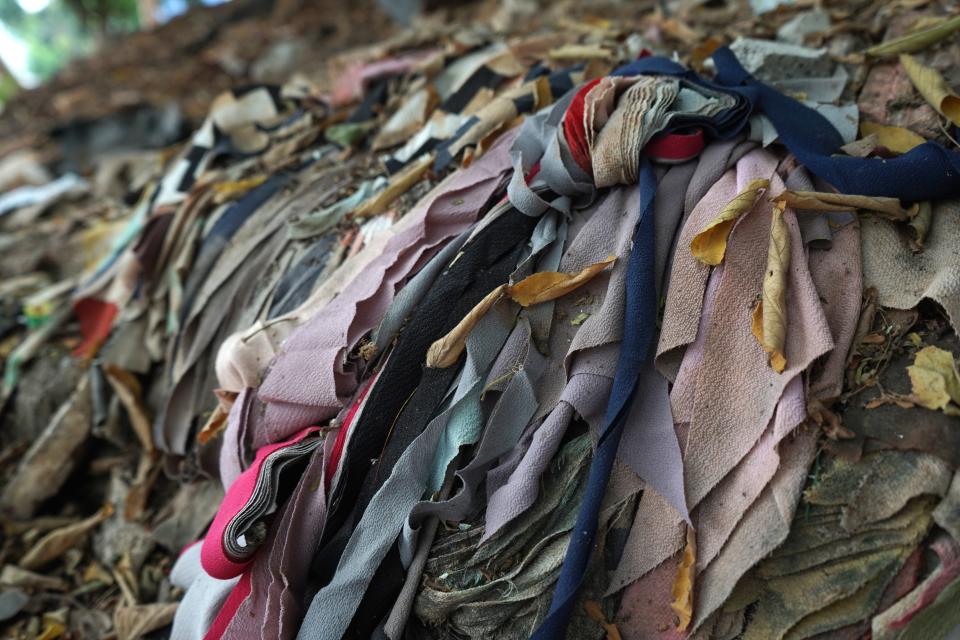Sustainable Fashion Has Lost Its Meaning. Here’s How We Change That.

Bloomberg
Whenever sustainable fashion comes up, the first question is: Where and how do people shop if they want to avoid fast fashion? And while I have an answer to that (some brands are prioritizing the rights of their workers, lowering the amount of clothing they produce, and innovating on materials that rely less on fossil fuels), the solution won’t be found by shopping.
Buying better, while a good step, can’t get us out of the climate crisis that fashion has significantly contributed to. Right now, the industry is estimated to make up around 3 to 5% of global carbon emissions, according to a 2023 report by McKinsey & Company. Clothing waste is growing at a rapid rate as production and the use of fossil fuel-based materials like polyester increases. In 2018, the United States estimated 17 million tons of textiles were discarded, much of which ends up in landfills or is shipped to the global south where it overwhelms communities. The workforce producing these textiles, which is made up of around 75 million garment workers worldwide, the majority of them women, are paid wages often as low as $113 a month.

Textile Garbage
Getty ImagesIn our consumer-focused culture, we often feel the need to buy our way out of a problem – and that’s a need that fast fashion brands have easily filled. Greenwashing has made it so that small changes by a brand, like switching to recycled polyester or organic cotton, supersede the fact that the amount of clothing produced is still growing, the amount of textile waste is increasing, and workers' wages and conditions are worsening. These small but insignificant changes are marketed (especially around Earth Day) as ways we can buy new, more apparently sustainable clothing, meaning we don’t need to feel bad about our continued overconsumption. The idea is to sell us on sustainability, not to actually practice it — because practicing it would mean buying radically less clothing.
That’s why we need to reframe the idea of sustainable fashion entirely. It needs to be a call to action and not a shopping guide.
Everyone changing their buying habits is, of course, ideal but that is a battle we’ll be fighting for a very long time, one that will require a massive cultural shift. We need a change in fashion now if we want to mitigate the damage that’s been done.
So if we shifted the idea of participating in sustainable fashion from being someone who wears the “right” thing to someone who prioritizes workers, climate-focused industry initiatives, and community, then maybe we could get somewhere. Here are a few examples: Legislation and attempts to regulate the way the fashion industry operates are popping up around the world. In Europe, there are a host of regulations and proposals aimed at greenwashing, overproduction, and even penalizing buying fast fashion. In the United States, there are bills tackling wages, emissions, and waste. All of these you can support through a phone call or a letter.
There are worker movements and strikes that go unnoticed. While some brands are selling women’s empowerment, the women who make the clothing are in the streets asking for better working conditions. We could amplify those stories through social media. There are advocacy groups that run awareness campaigns to push brands to regulate the amount of clothing they produce.
Outside of action, you can think of sustainability as a learning opportunity. You could mend your clothing and learn to sew or knit. You can read books about fashion (and not just those about sustainability). You could look at shopping as a way to reflect your personal style instead of a constant pursuit of trends and the next big thing.
And sure, there are ways to shop better that absolutely have an impact. Buying second-hand or recycled and extending the life of clothing is a way to keep it out of landfills, which is, no doubt, a good option. There are also great brands to shop. But to move forward, we need to realize that sustainable fashion has lost its meaning and it’s up to us to rewrite it.
Originally Appeared on Teen Vogue
Want more style stories from Teen Vogue? Check these out:

